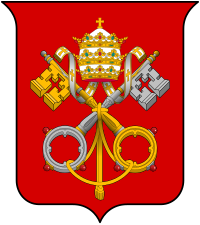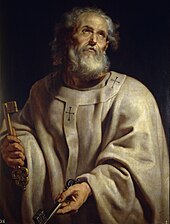Keys of Heaven

In ecclesiastical heraldry, papal coats of arms (those of individual popes) and those of the Holy See and Vatican City State include an image of crossed keys to represent the metaphorical keys of the office of Saint Peter, the keys of heaven, or the keys of the kingdom of Heaven, that, according to Roman Catholic teaching,[1] Jesus promised to Saint Peter, empowering him to take binding actions.[2] In the Gospel of Matthew 16:19, Jesus says to Peter, "I will give you the keys of the kingdom of heaven, and whatever you bind on Earth shall be bound in heaven, and whatever you loose on Earth shall be loosed in heaven."

The keys of heaven or keys of Saint Peter are seen as a symbol of papal authority: "Behold he [Peter] received the keys of the kingdom of heaven, the power of binding and loosing is committed to him, the care of the whole Church and its government is given to him [cura ei totius Ecclesiae et principatus committitur (Epist., lib. V, ep. xx, in P.L., LXXVII, 745)]".[3]
Saint Peter is often depicted in Roman Catholic and Eastern Orthodox paintings and other artwork as holding a key or a set of keys. The general layout of St Peter's Basilica also is roughly key-shaped; evocative of the keys entrusted to Saint Peter. Since the 16th century a symbolical pair of keys is created for every pope and buried on death with him.
Bible verses associated with Peter[4][5] and his position of authority: Is. 22:20-23; Matt. 10:2; Matt. 16:18-19; Luke 22:32; John 21:17; Acts 2:14; Acts 10:46; Gal. 1:18.
Bible verses associated with the transfer of powers from Pope to Pope: Acts 1:20; 6:6; 13:3; 8:18; 9:17; 1 Tim. 4:14; 5:22; 2 Tim. 1:6.
See also
- Keys of the kingdom
- Coats of arms of the Holy See and Vatican City
- Papal regalia and insignia
- Power of the Keys
- Primacy of Simon Peter
References
- ^ Catechism of the Catholic Church, para 881: "The episcopal college and its head, the Pope"
- ^ The Routledge Companion to the Christian Church by Gerard Mannion and Lewis S. Mudge (30 January 2008) ISBN 0-415-37420-0 p. 235.
- ^ "CATHOLIC ENCYCLOPEDIA: Power of the Keys". newadvent.org.
- ^ "CATHOLIC ENCYCLOPEDIA: Chronological Lists of Popes". newadvent.org.
- ^ "CATHOLIC ENCYCLOPEDIA: The Pope". newadvent.org.
